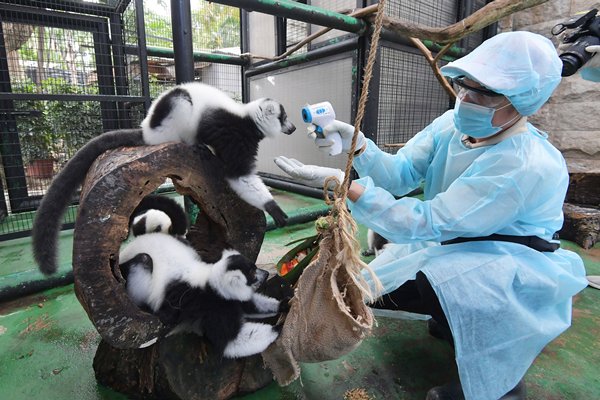Protecting Primates At HK Zoo

The Siamangs or black-furred gibbons and their famous friends the Bornean Orang-utan twins have not seen many curious visitors around their enclosure for a while.
Their home at the mammal section of the Zoological & Botanical Gardens has been temporarily closed due to the COVID-19 epidemic.
Playful tricks
Despite the lack of visitors, staff ensured the playful primates were kept busy.
To keep the animals active, the zookeepers incorporated a variety of training techniques, such as tying fruit to tree trunks to motivate them to climb and move around the enclosure.
“We make food balls to encourage them to use their fingers to take the food. This ensures they frequently use their fingers and stimulates their brain, since they have to figure out how to get the food,” Leisure & Cultural Services Department Senior Amenities Assistant Cheung Wai-lam explained.
Reducing risk
The animals not only stayed active but continued to grow healthy during the epidemic with the help of their caretakers.
Stringent anti-epidemic measures have been implemented at the gardens to protect the health of the animals living there.
Staff must wear full protective gear, such as gowns and face masks, as well as disinfect their footwear each time they enter the mammal enclosures.
Mr Cheung noted that the mammals get their temperatures checked and their health is closely monitored.
“The animals’ eyes, ears, mouth and nose are checked to see if they have a runny nose or tears. We will also assess the flexibility of their arms and legs and if they have any wounds. We look at if they are breathing fast which could mean they are nervous. Also, their coats should be bright and waterproof to indicate that they are healthy.”
Breeding season
The mammal families at the gardens expanded during the epidemic.
The Buff-cheeked Gibbons, Ring-tailed Lemurs, White-faced Sakis, Black & White Ruffed Lemurs and Cotton-top Tamarins all welcomed new additions to the family.
Mr Cheung said the birth of a Cotton-top Tamarin in May was particularly special.
“We are very happy about the birth as the Cotton-top Tamarin is an endangered species. They are not only bred overseas. Now we have one born in Hong Kong. We provide them with protein-rich foods and grow their favourite plants to create a good environment for them to breed.”
The Zoological & Botanical Gardens enhanced cleaning and disinfection of the mammal enclosures during the epidemic.
During these days when seeing the primates is not possible, the public may learn more about their characteristics and behaviour through the Leisure & Cultural Services Department’s online platform Edutainment Channel and get prepared for future visits.
Moving Waste Management Forward
Located on an artificial island near Shek Kwu Chau, the Integrated Waste Management Facilities Phase I, I·PARK1, repr... Read more
Walkway Fulfills Harbourfront Vision
Since opening late last month, the Eastern Section of the East Coast Boardwalk, at North Point, has been a popular dra... Read more
Hiking Challenge Honours Natural Gem
As the sun rises over Victoria Harbour, the city starts its day with people filling Lugard Road – jogging, walking d... Read more
Autonomous Vehicles Drive HK Forward
Autonomous driving technology is advancing rapidly, with the potential to boost traffic efficiency and improve road sa... Read more
Supercomputing Sparks AI Innovation
To promote the development of the local artificial intelligence (AI) ecosystem, the Government has allocated $3 billio... Read more
Tours Showcase HK Brands
Imagine being able to step back in time to a 1950s grocery store where the product packaging is full of nostalgic char... Read more

